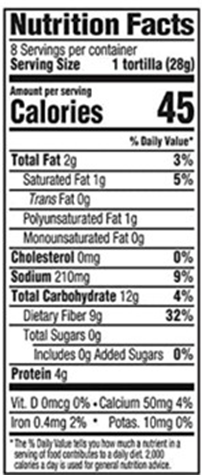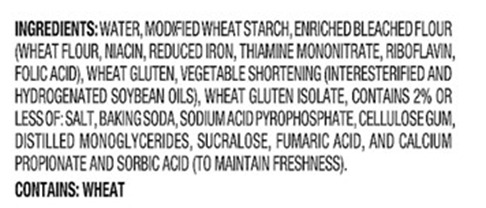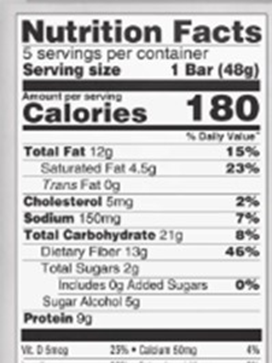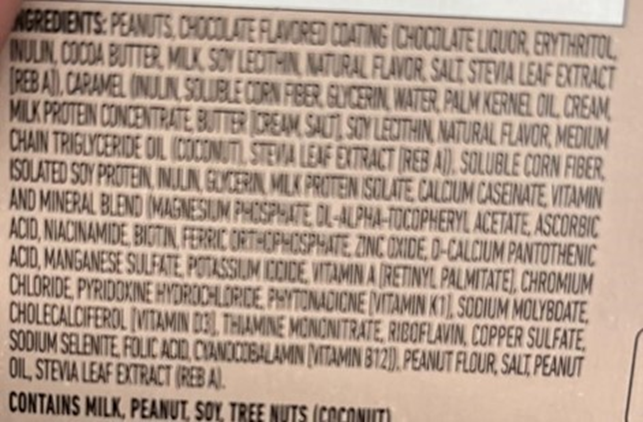I see “low carb” this and “keto-friendly” that at the store. Are those okay?
It depends. Some low-carb or “keto friendly” foods are created by companies led by people who really want to provide metabolically healthy options for us. They are minimally processed, using real food as their ingredients. Other companies are just trying to cash in on a growing trend and don’t seem to care much about what they put in their food (I am here thinking of Mission, purveyor of delicious yet nutritionally dubious low-carb tortillas).
A low-carb substitute (for bread, tortillas, cookies, crackers, desserts) may or may not be okay for us, depending on what is in it and how our bodies react to it.
On a low-carb substitute’s package you will typically see a reference to “net carbs.” The idea is that some forms of carbohydrate—fiber and alcohol sugars —are not digested and pass into our gut where some of it is digested by the microbes there, and so don’t affect our blood sugar. That is partially true. The alcohol sugars erythritol and xylitol do not have much effect on our blood sugar, but maltitol and sorbitol do (though not as much as glucose). So read the label carefully. (Some recent research suggests that erythritol can increase blood clotting in unhealthy ways. It may be best to avoid that until the research is in on that.)
Low-carb breads and tortillas typically substitute fiber for starch. Substitute desserts usually substitute alcohol sugars for sucrose.
Some alcohol sugars do provide sweetness without spiking blood sugar, but there isn’t really enough data to know about the health impacts of consuming them (particularly their effect on the microbes in our gut). One observation I have made is that consuming more than a small amount of alcohol sugar sweeteners can have untoward effects. (For a demonstration of the possible effects of overconsuming alcohol sugars, see Daniels, J. (1994); Dumb and Dumber; “Toilet Scene.” [film])

Other non-caloric sweeteners include stevia, which is an extract from a plant; aspartame, created from amino acids; and sucralose, a chemically modified form of a sucrose molecule that we taste the sweetness of but do not metabolize. A newer non-caloric sweetener that is gaining popularity is allulose. It occurs naturally but scientists have learned to synthesize it. There is some evidence that allulose can have positive effects on our microbiome and blood sugar, but it is too early to say for sure.
Eating these substitutes can cause cravings of their own, and if one isn’t careful they can become a larger and larger part of the diet. It is probably best to reserve them for special circumstances rather than using them as staples of your diet.
On the plus side, these substitutes may help some people avoid refined carbs and added sugar, and so can help them to maintain their metabolic health. One might compare it to a cigarette smoker who turns to vaping when unable to quit tobacco. It would be better to do neither, but vaping is (perhaps) less harmful than smoking cigarettes.
In deciding whether to eat one of these substitutes, it is crucial to look past the health claims on the package and pay attention to the nutrition and ingredient labels. To calculate the starch and sugar intake, subtract the fiber and alcohol sugar from the total carbohydrate to get the net carbs. For example, on this package of Mission “Carb Balance” tortillas, we see that it has 12 grams of carbohydrates, 9 grams of which are fiber. Since the fiber is not converted to glucose but passes on into our gut, there are only three grams left to convert to glucose. So far so good.

But then we come to the ingredient label, which is something of a horror show. Interesterified and hydrogenated soybean oils? That sounds like something one might use to refinish a coffee table.

Or how about this SlimFast “Keto Nutty Caramel & Nougat” bar. It has 21 grams of carbohydrate, but after you subtract out the 13 grams of fiber and 5 grams of sugar alcohol, you are left with only 3 grams of net carbs. Seems like a reasonable option.

Until we get to the ingredient label. Egad! Unless you happen to hold a PhD in chemistry, you will likely not know what most of those things are, much less be able to gauge their possible impact on your health.

We should never forget that the food that comes out of the ground or from animals is going to be better for us than that which comes out of a box.